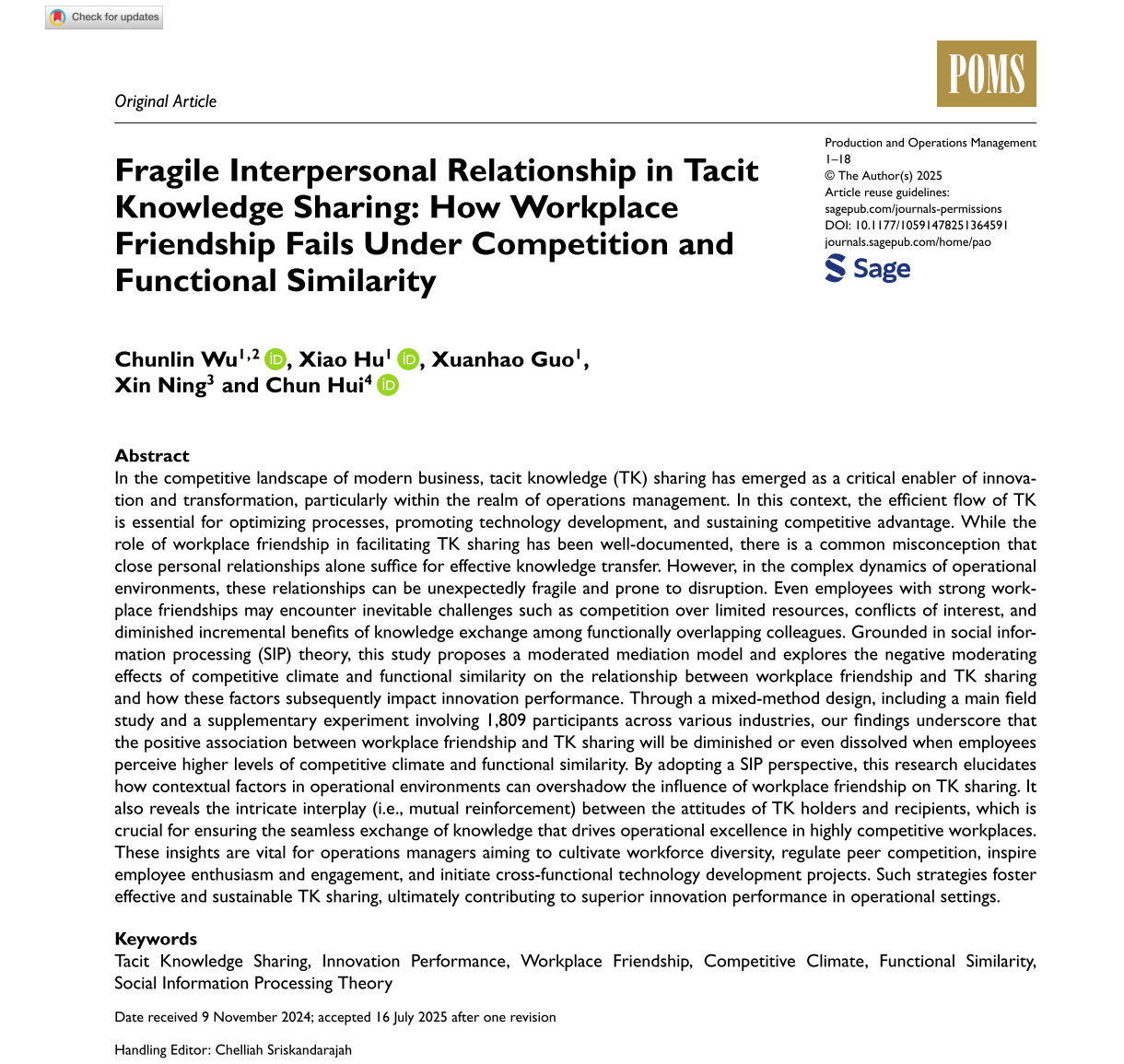Recently, Associate Professor Chunlin Wu and his coauthor had a paper “Fragile Interpersonal Relationship in Tacit Knowledge Sharing: How Workplace Friendship Fails Under Competition and Functional Similarity” published in Production and Operations Management (UT/Dallas 24). Associate Professor Wu is the first author, Xiao Hu, a 2024 Ph.D. student at our School of Economics and Management, is the second author, and Professor Chun Hui from The University of Hong Kong is the corresponding author. The School of Economics and Management, Beihang University, is the first affiliation. This research was supported by the National Natural Science Foundation of China (Grant Nos. 72171014 and 71801007) and the Hong Kong Research Grants Council (Grant No. HKU17501722).

In today’s highly dynamic and competitive business environment, effective knowledge management is recognized as a key factor in sustaining organizational advantage. Among different types of knowledge, tacit knowledge, embedded in experience, intuition, and everyday practice, is particularly difficult to codify and transfer. Yet, it often plays a central role in improving operational processes, strengthening organizational resilience, and enhancing innovation performance. For many years, both academic research and managerial practice have tended to assume that positive interpersonal relationships, especially workplace friendships, naturally promote the sharing of tacit knowledge. However, evidence from operational settings suggests a more complex reality, i.e., even in teams where members have close relationships, tacit knowledge sharing may stagnate. The mechanisms underlying this phenomenon remain underexplored.
To address this gap, this study adopts a more refined perspective that contextual factors within operations management shape the extent to which workplace friendship exerts influence. Drawing on social information processing theory, this research identifies two critical contextual variables (i.e., competitive climate and functional similarity) and develops a moderated mediation model to examine their effects. Using a mixed-method approach that combines a three-wave longitudinal study with vignette-based experiments, this study validates the model and reports three key findings.
(1) Positive effect of workplace friendship: Friendship encourages tacit knowledge sharing by strengthening both the sharing attitude of knowledge holders and the learning attitude of recipients, ultimately enhancing team innovation performance.
(2) Negative moderating effects of contextual factors: Excessive competition climate or high functional similarity among team members diminishes and, in some cases, erases the positive impact of workplace friendship on tacit knowledge sharing.
(3) Mutual reinforcement of sharing attitude and learning attitude: Attitudes toward sharing and learning reinforce each other, producing a stronger joint effect on tacit knowledge exchange.
Overall, this study uncovers the comprehensive mechanism through which workplace friendship shapes tacit knowledge sharing in operational contexts and offers novel theoretical and managerial implications. Although workplace friendship is a powerful driver of tacit knowledge sharing, its effectiveness is inherently constrained by team climate and structure. In complex operational settings, managers can sustain and translate the benefits of friendship into competitive advantage by balancing competition and fostering functional diversity among team members. By aligning interpersonal quality with contextual optimization, teams can continuously stimulate tacit knowledge sharing and effectively transform it into team-level innovation performance.
The full article is available at: https://journals.sagepub.com/doi/10.1177/10591478251364591